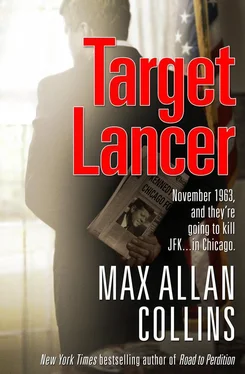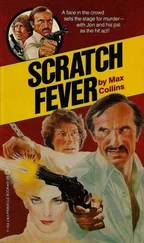Max Collins - Target Lancer
Здесь есть возможность читать онлайн «Max Collins - Target Lancer» весь текст электронной книги совершенно бесплатно (целиком полную версию без сокращений). В некоторых случаях можно слушать аудио, скачать через торрент в формате fb2 и присутствует краткое содержание. Жанр: Криминальный детектив, на английском языке. Описание произведения, (предисловие) а так же отзывы посетителей доступны на портале библиотеки ЛибКат.
- Название:Target Lancer
- Автор:
- Жанр:
- Год:неизвестен
- ISBN:нет данных
- Рейтинг книги:5 / 5. Голосов: 1
-
Избранное:Добавить в избранное
- Отзывы:
-
Ваша оценка:
- 100
- 1
- 2
- 3
- 4
- 5
Target Lancer: краткое содержание, описание и аннотация
Предлагаем к чтению аннотацию, описание, краткое содержание или предисловие (зависит от того, что написал сам автор книги «Target Lancer»). Если вы не нашли необходимую информацию о книге — напишите в комментариях, мы постараемся отыскать её.
Target Lancer — читать онлайн бесплатно полную книгу (весь текст) целиком
Ниже представлен текст книги, разбитый по страницам. Система сохранения места последней прочитанной страницы, позволяет с удобством читать онлайн бесплатно книгу «Target Lancer», без необходимости каждый раз заново искать на чём Вы остановились. Поставьте закладку, и сможете в любой момент перейти на страницу, на которой закончили чтение.
Интервал:
Закладка:
Which is what it did-leave off. Our giant steak arrived, and our talk turned to other things, too dull for me to remember.
So now I was thinking about my fifty-something fan dancer as I sat parked in a Secret Service Chrysler on Division Street next to a Negro agent who was once again staring too conspicuously at the lodging place of our subjects.
“You’re doing it again,” I told him.
“They’re coming out.”
I sat up.
The two Cubans were in tan zippered jackets, chinos, and sneakers, same as before, but they were not joshing around with each other, not today. In fact their expressions were sober and they walked with what might be termed purpose. Or was I reading in?
Anyway, they got into their green Pontiac-Gonzales driving, Rodriguez riding-and pulled out into the light traffic. I caught a break by way of a lull that let me pull a U-turn and fall in a couple of cars behind them. They were in no rush, heading west into a run-down area, home of hookers who liked to call nearby Clark Street “the Rush Street of the Working Man.”
The Pontiac crossed LaSalle where Urban Renewal was busy creating the future by displacing the present. Just to the north, Carl Sandburg Village (named for the Bohemian newsman poet) housed white-collar Loop workers. Like the moon, its towers were seen by the people around here, but they could not hope to live there.
We tailed the green Pontiac past Wells and under the Ravenswood El. Just north were the blocky towers of Cabrini Green, a modern high-rise slum replacing the Sicilian tenements of Little Hell.
Beyond Halsted, the green buggy crossed the ancient, stone-towered steel-lift bridge that led onto Goose Island, three blocks of industrial wilderness-warehouses, manufacturing lofts, scrap-metal junkyards. As we rolled by in slow pursuit of the Cubans, large chunks of iron whooshed into the air, with a rattle like the Devil trying for seven or eleven-a missed tank of compressed gas, not entirely emptied, had made its way into a crusher.
Neither Eben nor I registered any surprise at this explosion.
From Goose Island we were led below the new four-lane expressway, Mayor Daley’s extension of the national highway system linking Chicago to Wisconsin and Indiana, and O’Hare to the Loop, a concrete ribbon across the North and Northwest Sides that had made fortunes for insider speculators in right-of-way property. Would have been nice if one of my wealthy clients had clued me in. Hadn’t I helped save or end enough fat-cat marriages to rate that?
Soon we were in an older neighborhood, once Polish, Russian, and Jewish, now turning Puerto Rican; well-kept older storefronts with apartments above mingled with small narrow two- and three-flat buildings. Things seemed more run-down on side streets. West Town (as the area was called) was dominated by looming factories and the steeples of its many churches, mostly Catholic.
Now we entered a wide square where Ashland-a major four-lane street-bisected Division, and where another angled street, Milwaukee Avenue, also crossed. What you probably noticed first was the three-story building to the north whose huge sign announced DAILY ZGODA.
Taking that in, Eben asked, “A Polish newspaper?”
“For more Poles than Chicago,” I said, “I suggest Warsaw.”
A small central park featured junkies wandering, and was an old woman taking a crap in the grass? Yes, she was. And those old guys passing her on the sidewalk, hauling grocery bags, either didn’t notice or didn’t care.
The Pontiac turned north on Milwaukee, where block after block of stores awaited, of all types and all nations, signs in Polish, signs in Russian, signs in Spanish, even a few in English. Cuba’s flag was painted on some store windows and Puerto Rico’s on others. The spire of the Morris B. Sachs flatiron building, five blocks north, dominated this fiefdom of two- and three-story buildings with their storefronts below and apartments above.
“They’re pulling over,” Eben said.
“I see it.”
The Bonneville pulled into a place near where a side street cut across, no light, no stop sign. I went on through the intersection-having to pick my way through the light traffic-and pulled into a place half a block up.
Eben, turning to watch, said, “They’re getting out. Cutting over to that side street.”
I shut off the engine. “I’ll see where they’re going.”
Eben nodded, content to stay put. Not many Negroes around this part of town. Not any, right now, except him.
As I rounded the corner, the Cubans were entering a storefront in the middle of the block. Pedestrians were mostly older people and moms with little kids, apparel ranging from Sears to rummage store, Poles outnumbering Puerto Ricans two to one. A few winos, a few junkies. No Cubans to speak of-they were the area’s ownership class.
I walked down to where Gonzales and Rodriguez had disappeared and found an old kitchenette with GOOD FOOD written in big bold red cursive on the window. Through the glass, between two flags painted there (Cuba and Puerto Rico), I could see our two subjects heading toward the back. They slipped into a booth, sharing the same side.
Cozy.
I walked quickly back to the car and leaned in like a carhop, telling Eben, “Drive around and find a place opposite ‘Good Food’ restaurant. Middle of the block. They’re in there. Keep a close watch.”
“What about you?”
“I’m going to have a Coke. Haven’t you heard? It’s the pause that refreshes.”
I headed back for the luncheonette.
Good Food’s food smelled good, in a carnival kind of way. The old restaurant was just a clutter of Formica tables with kitchen chairs on linoleum, rows of wooden booths along the left and right walls. Across the rear was a counter behind which was a diner-style window onto the kitchen. This time of afternoon was slow, but about a dozen customers were seated, mostly Puerto Ricans.
Running the place was a skinny man and a plump woman, handsome Cubans in their late thirties, neatly dressed in white shirt and slacks, or in the woman’s case dress. Husband and wife, most likely, with hubby at the register and the better half behind the diner counter. Behind her, dark faces scurried in the kitchen.
Over the serving window was a big wide plastic menu board, courtesy of Coke-listing sandwiches geared toward both Poles and Latinos: Polish sausage, fritas, plus typical diner fare. On the walls were Orange Crush, Green River, and 7-UP signs, but behind the register hung a huge “Old Cuba” calendar with a magnifico color photo of the Hotel Nacional in Havana, once owned by that great native Cuban, Meyer Lansky.
Exiles owned all the stores around here, thanks to SBA loans-seemed Uncle Sam wanted to show the Cuban DP’s just how much better America was than Castroville. As Spanish speakers, they could serve the Puerto Rican customers well. But resentment was brewing, since the PR’s-like the Negroes-somehow couldn’t seem to wrangle those kind of loans.
At the counter, I ordered a Coke, glad to be in street clothes and unshaven, just another working stiff. The zippered Windbreaker was blousy enough to conceal the holstered nine-millimeter under my arm, and I was hardly the only white guy in the joint. For example, there was a joe in a work shirt and matching pants eating a Polish sausage sandwich just down from me. And down from him, a husky guy in a checkered shirt and black pants having chicken soup.
And two white guys just over to my left, sitting on the same side of a booth …
… across from the pair of Cubans we’d tailed here.
Not just any white guys, either-these were (as Sergeant Shoppa of the Chicago PD had dubbed them) Smith and Jones, the ex-soldier Southern boys with butch haircuts who rounded out the set of four Justice Department surveillance photos. Collect them all.
Читать дальшеИнтервал:
Закладка:
Похожие книги на «Target Lancer»
Представляем Вашему вниманию похожие книги на «Target Lancer» списком для выбора. Мы отобрали схожую по названию и смыслу литературу в надежде предоставить читателям больше вариантов отыскать новые, интересные, ещё непрочитанные произведения.
Обсуждение, отзывы о книге «Target Lancer» и просто собственные мнения читателей. Оставьте ваши комментарии, напишите, что Вы думаете о произведении, его смысле или главных героях. Укажите что конкретно понравилось, а что нет, и почему Вы так считаете.












